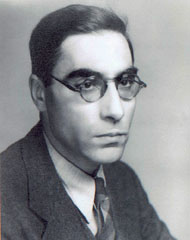|
|
 |
 |
 |
 |
|
ALUMNI PROFILELouis Zukofsky '24, Pioneer Objectivist Poet, To Be Celebrated Upon His CentennialBy Paul Stephens '98 GSAS
To Ezra Pound in 1933, Louis Zukofsky '24 wrote of himself: "L.Z. cannot teach in Columbia Univ. and L.Z. takes it for granted." Now acknowledged as one of the most important American poets of his generation, Zukofsky believed that he could not return to his alma mater because he was a Jew and a Marxist. That Zukofsky would confess his frustration with Columbia to Pound, a notorious anti-Semite, stands out as a remarkable episode in Zukofky's long and fascinating life. Since his death in 1978, Zukofsky slowly has risen in the estimation of literary scholars, yet his work still is not widely read. William Carlos Williams claimed that Zukofsky was "the most important and neglected poet of our time." Like the writing of James Joyce or Gertrude Stein, which he admired, Zukofsky's writing is hermetic, allusive and challenging. Difficult though it may be, his poetry rewards the persistent reader. Zukofsky's poems are richly musical and formally innovative, and they present an enduring personal record of American cultural politics from the 1920s through the 1970s. From September 17-19, a centenary celebration of Zukofsky's work will take place at Columbia and Barnard, with many important poets and scholars in attendance. This is significant because after graduating, having also earned a master's in English and comparative literature from GSAS in 1924, Zukofsky was never invited back to speak, read or teach. Born on the Lower East Side in 1904 to Yiddish-speaking Russian immigrant parents, Zukofsky went to Columbia at 16. It was an auspicious time to be there: His professors included John Dewey, Franz Boas, Frederick Woodbridge, John Erskine (Class of 1900) and Mark Van Doren. His best friend at Columbia was Whitaker Chambers '24. Zukofsky's poetic career received its greatest boost when Pound responded favorably to a selection of his work in 1927. The two would form an enduring, at times painful, friendship. Pound introduced Zukofsky to Williams, and it was largely through Pound that Zukofsky came to know a wide circle of poets, including George Oppen, Charles Reznikoff, Lorine Niedecker and Basil Bunting. He coined the term "Objectivism" to describe his work and theirs; collectively, the Objectivist poets sought to write an unsentimental, socially committed poetry that would feature, in Pound's terms, "direct treatment of the thing." Pound became increasingly fascist and anti-Semitic in the 1930s and his growing mental instability exasperated Zukofsky. Even so, Zukofsky felt a debt of gratitude to Pound and defended him even after Pound was convicted of treason after World War II. During the 1940s, Zukofsky gradually left Marxism behind. He and his wife, Celia Thaew, whom he married in 1939, had a son, Paul, in 1943, and his poetry centered increasingly on the family. Around this time, Zukofsky undertook a mammoth critical project titled Bottom: On Shakespeare. He also continued work on his epic poem "A", which he would finish in 1974. Throughout the 1950s and '60s, Zukofsky led a life of relative tranquility, teaching English at Brooklyn Polytechnic Institute. Despite his relative anonymity, he continued to be prolific, and his writings inspired a new generation of poets including Robert Creeley, who will speak at the conference, and Allen Ginsberg '48. For his 80th birthday, Zukofsky planned a collection of poems titled 80 Flowers. Each poem was to correspond to a flower and have eight lines of five words per line. A poem such as Zinnia displays the rich difficulty of his late work and, like many Zukofsky poems, is best read aloud: With prayer-plant eyes annually winter-leggy For his 90th birthday, Zukofsky planned a collection called 90 Trees, which would parallel 80 Flowers. He died at 74, just after finishing 80 Flowers ahead of schedule. As we welcome Zukofsky back to Columbia, 80 years after his graduation and 100 years after his birth, we can only imagine what his poems to celebrate a century would have looked and sounded like. Paul Stephens '98 GSAS is a Ph.D. candidate in English.For more information about the September 17-19 Louis Zukofsky Centennial Conference, contact him at ps249@columbia.edu, or visit the conference Web site, http://writing.upenn.edu/epc/authors/zukofsky/100/.
|
|
|||||||||||||||||||||||||||||||||||||||||||||||||||||
